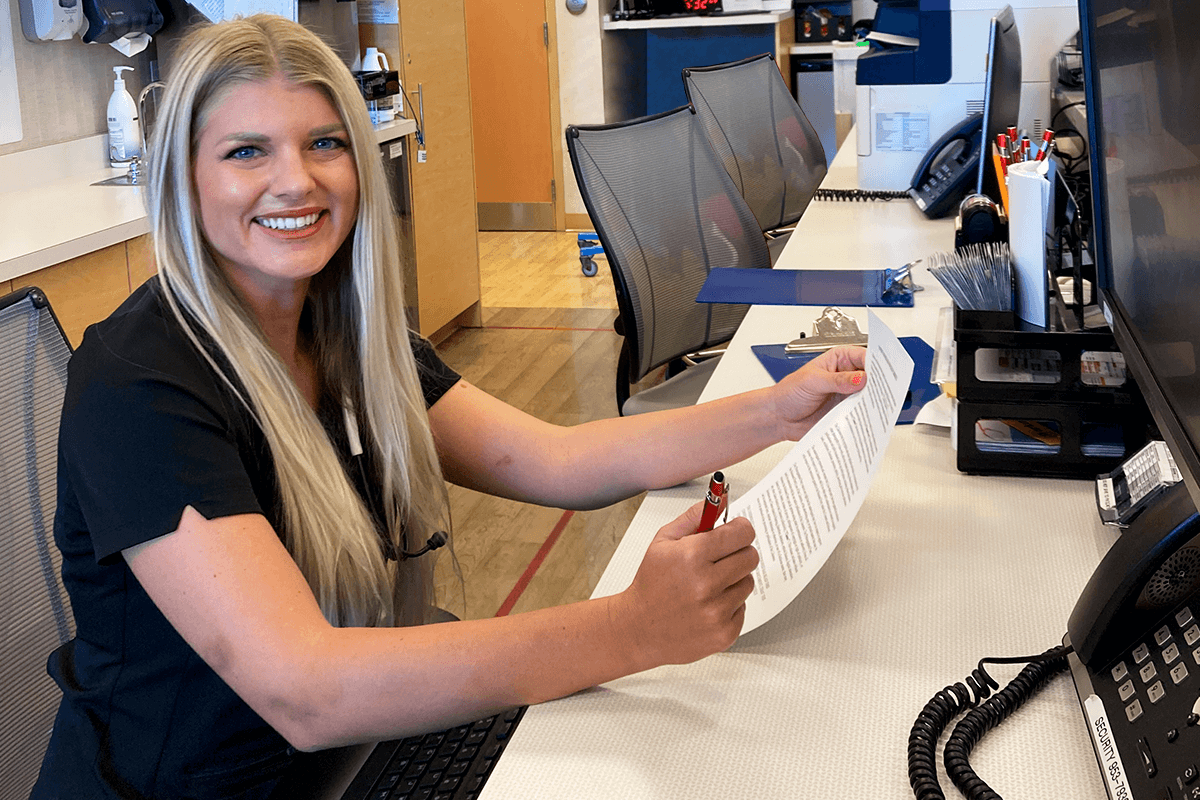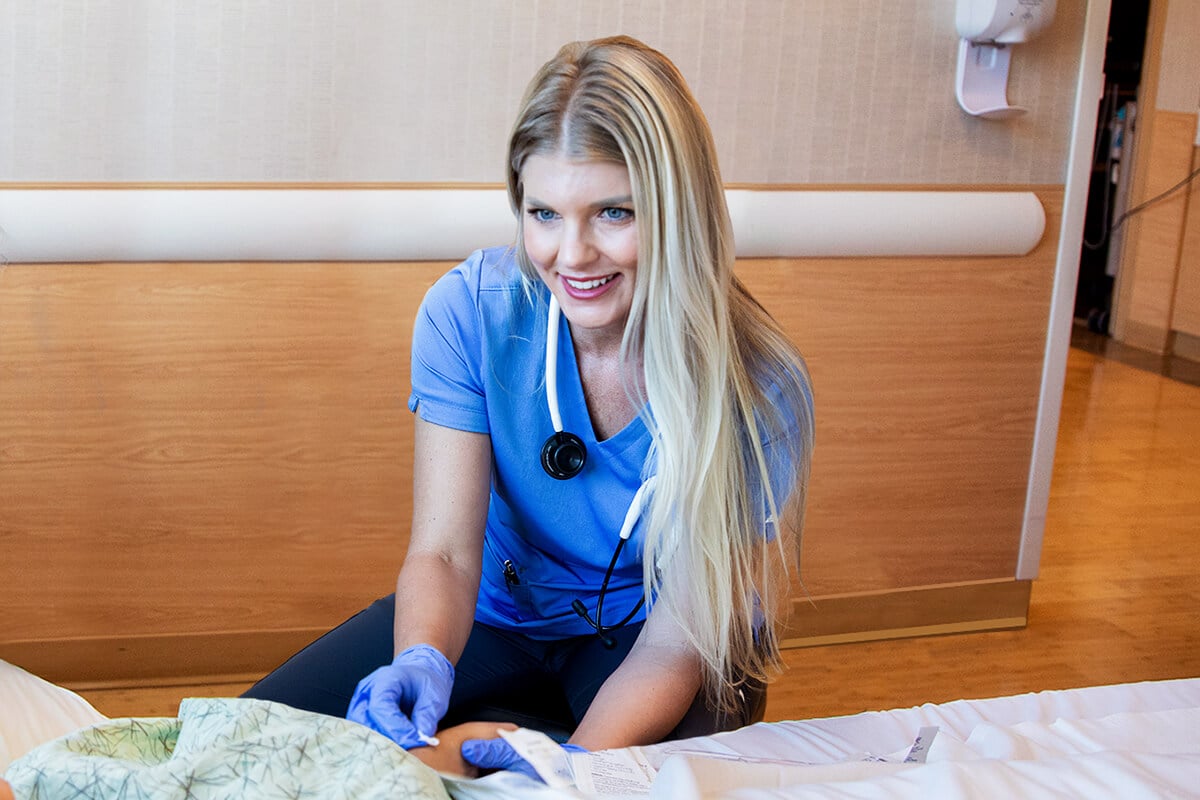This content contains discussion of abuse and domestic violence.
Has someone alleged that you would make a great forensic nurse? Not many nurses have exposure to the unique and rewarding career of forensic nursing. A forensic nurse is a healthcare professional that specializes in the communication and assessment of suspects and victims of crimes, as well as providing trauma-informed nursing care.
Forensic nursing is an umbrella term for many different types of nursing, including sexual assault nurse examiners (SANE), nurse coroners, pediatric forensic nurses, geriatric forensic nurses, and more.
Here’s how to become a forensic nurse and what skills and personality traits are best suited for forensic nursing.
The Terms and Conditions: How To Become A Forensic Nurse
1. Pass nursing school and pass the NCLEX-RN or NCLEX-PN.
Like all nursing specialties, you’ll need to pass nursing school and your nursing board exam. The field of forensic nursing is available to any RN, LPN, or even nurse practitioner.
2. Gain nursing experience.
Forensic nursing isn’t recommended for new graduate nurses. If you worked previously as a medical assistant or another type of healthcare worker, this can help build on your experience. But skills in assessment, triage, and communication skills are vital in forensic nursing. Any capacity of bedside nursing experience for 2-3 years is acceptable to become a forensic nurse. However, experience in labor & delivery, critical care settings, and emergency department transition nicely into forensics.
3. Earn a certificate in SANE.
In order to begin practicing, you’ll need to take a 40-hour sexual assault nurse examiner (SANE) course from the credentialing body for forensic nurses, called the International Association of Forensic Nurses (IAFN). There is no test at the end of the course.
4. Apply for a job in forensic nursing.
After gaining experience and the SANE certification, you’ll be ready to apply for a job in forensic nursing.
5. Consider getting certified in forensic nursing.
Once you have been a practicing forensic nurse for 300 clinical hours, you can choose to sit for a certification exam. This is similar to other certifications in nursing for other specialties.
The Scene of The Crime: A Day In The Life of A Forensic Nurse
Forensic nurses may work on-call, or work 8, 10, or 12-hour shifts depending on their role and location. Although the job duties vary, many forensic nurses have a “home base” in a clinic or hospital setting.
Samantha Mendez, MPH, RN, SANE-A, SANE-P, a forensic nurse supervisor at HonorHealth in Phoenix, Arizona shared what types of activities forensic nurses may do day-to-day. These will vary depending on the county and the individual position a forensic nurse works in.
Day-to-day activities include:
- Examining patients (suspects and victims of abuse, trauma, or assault, including elder abuse or child abuse)
- Collecting evidence for sexual assault and domestic violence cases
- Testifying in a courtroom setting of evidence found in patient examination and treatment rendered in the clinical encounter
- Educating the community about trauma-informed care and domestic violence
- Providing trauma-informed care in disaster relief settings
- Post-mortem examinations and evidence collection
A typical day in the life of a forensic nurse will vary, especially because they don’t remain in one stationary location. They may get called to go to the hospital, perform outpatient nursing in a clinic across town, and may travel short distances throughout the day.
Cross-Examination: Skills Used in Forensic Nursing
Legal Knowledge
If a forensic nurse once cared for a patient that is now involved in a court case, their clinical documentation may be admitted as evidence and the nurse may be called to testify. This can happen at any time within the statute of limitations, which could be years later. Some forensic nurses testify in court more often than others, but it typically occurs up to a few times per year.
Scientific Investigation
Forensic nurses must be up to date with evidence-based practice to be able to testify in court at any time with the most updated knowledge in their field. They also need to have excellent knowledge in their field to conduct assessments and evaluations of their patients accurately.
Psychological Knowledge
Forensic nurses encounter patients facing all types of trauma. This involves therapeutic communication and an understanding of human psychology. Forensic nurses may take care of victims or suspects, and each requires compassionate care and therapeutic communication in individual ways.
The Suspects: Who Would Make A Great Forensic Nurse?
Mendez says that there are two main qualities that make a great forensic nurse:
1.Compassion.
The nature of forensic nursing is very sensitive. You’ll encounter both victims and suspects of crime. You have to be a patient advocate in all situations, and you must have top-notch listening and communication skills. It requires that nurses take care of themselves and avoid burnout in order to continue providing excellent care.
2. Attention to detail.
Because documentation is often used in legal cases, having the ability to paint a clear picture in documentation is vital. It may be years before a subpoena in a court case, and you would have to testify on your own documentation because your recollection of that patient encounter will likely be hazy.
Line of Questioning: Forensic Nursing FAQs
Mendez answered some of the most frequently asked questions about forensic nursing.
1. Do you work for the police or the FBI?
“No. There are some nurses that do work for the FBI, but the majority of them work for health systems in their local area. Forensic nurses do work with law enforcement, but we are first and foremost patient advocates.”
2. Is it scary to testify in a court case?
“It is nerve-wracking for a lot of new forensic nurses. We do answer questions from the prosecuting and defense attorneys, so we are cross-examined. I think of it as another form of patient education. In this scenario, I’m educating a jury so they can make a decision.”
3. What is the best part about forensic nursing?
“My favorite part is patient advocacy. I especially love working with pediatric patients. I love that I get to be a trusted adult for them. “
Are You Cut Out For Forensic Nursing?
Forensic nursing is an emotionally taxing but rewarding career. Empathetic and methodical nurses are poised to excel in this specialty. Because forensic nursing consistently offers a variety of scheduling, location and daily tasks, it’s a great fit for those looking to switch up their nursing careers.
Want to tackle your next career move in super soft scrubs? Check out Moxie Scrubs.
Resources:
Exclusive interview with Samantha Mendez MPH, RN, SANE-A, SANE-P, forensic nurse supervisor at HonorHealth in Phoenix, Arizona
https://www.forensicnurses.org/






